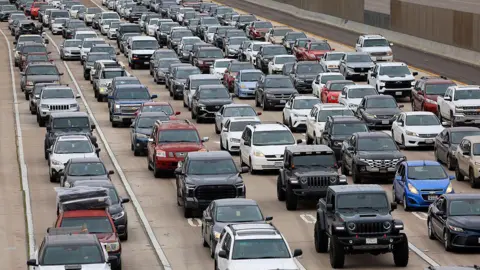US Congress moves to block California ban on petrol-only cars
 Getty Images
Getty ImagesLawmakers in Washington are moving to block a landmark California law that would have banned the sale of petrol-only cars in the state by 2035.
The Senate followed the House in voting to effectively kill the law, nullifying a waiver granted to the state that had allowed it to set stricter auto emissions standards than those set by the federal government.
The vote is a win for Republicans, energy firms and carmakers. It's a blow to Democrats and environmental groups, which saw the rule as a key step to addressing pollution and climate change.
President Donald Trump is expected to sign the measure, likely setting the stage for a legal battle.
"This federal government overreach is illogical, politically motivated and it comes at the expense of Californian's lives and livelihoods," said California Attorney General Rob Bonta, who said the state would sue over the move.
Trump had previously attacked California's plan to phase out gas cars, which, in part because of the state's size, was expected to have significant influence over the wider car industry in the US.
Roughly a dozen other states, including New York, Massachusetts, Colorado and New Mexico had intended to follow the California rules, representing more than a third of the car market, according to the industry.
Electric vehicles, including hybrids, represented about 10% of new car sales in the US, compared with roughly 30% in the UK last year, according to the International Energy Agency.
In the UK, the government has put forward a plan to phase out sales of new petrol and diesel cars by 2030.
In the US, critics had argued that the standards - which included the requirement that electric cars make up 35% of new car sales in 2026 - were unachievable.
Carmakers had argued that a related credit scheme - in which manufacturers earned and traded credits for selling electric vehicles - would result in car companies having to buy credits from Tesla, a leading manufacturer of electric vehicles. If they had to buy credits to meet a legal requirement, it would hinder their ability to invest in producing their own electric cars, the makers argued.
"The concerns were about the mandate – not the technology," said carmaker lobby group president John Bozzella of the Alliance for Automotive Innovation.
But the Natural Resources Defense Council said halting the standards made "no sense".
"They reduce costs for drivers, boost domestic manufacturing, improve air quality, and help address the climate crisis," president Manish Bapna said.
"If other states don't like California's approach, they don't need to follow it—but federal lawmakers shouldn't be intervening to block states from providing cleaner air and a healthier environment."
California, where electric cars made up about a quarter of new car sales last year, has received waivers from the EPA to establish stricter standards for decades, in order to address the state's long-running air quality issues.
Trump in his first term moved to strip California of its powers, setting off a legal battle that fizzled out when former President Joe Biden won the 2020 election.
Congress has historically stayed out of the fight.
Both the Government Accountability Office and the Senate parliamentarian, who is charged with interpreting Senate rules, said Congress was not following proper procedure to repeal the rule.
The leader of the Democrats in the Senate had accused Republicans of using a "nuclear option" to block the waiver, implying it could take similar steps against other agency rules.
The measure ultimately passed 51-44, on largely partisan lines.
